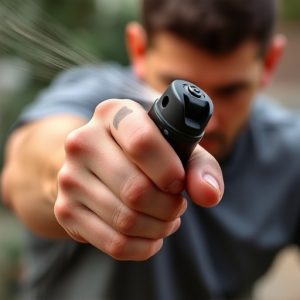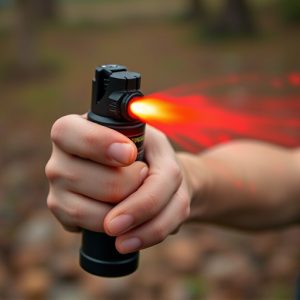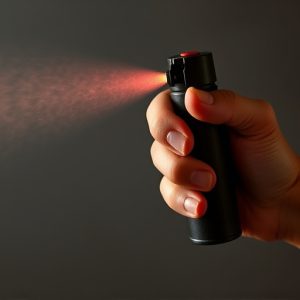Mastering Bear Spray: Usage, Storage, and Responsible Disposal
Bear spray is an effective self-defense tool against bears and large animals, utilizing capsaicin to…….
Bear spray is an effective self-defense tool against bears and large animals, utilizing capsaicin to cause temporary irritation. Proper usage involves aiming at the animal's face and eyes for maximum protection. Responsible disposal of expired pepper spray cans is crucial, following manufacturer instructions and local regulations to prevent environmental harm. Key steps include storing bear spray in a cool, dry place, checking expiration dates (typically 2-3 years), and disposing of expired canisters at designated hazardous waste facilities to minimize ecological impact.
“Staying safe in wild environments is paramount, especially when facing potential animal attacks. This guide explores the effectiveness of bear spray as a crucial defense mechanism. We’ll delve into the science behind its composition and how it works against bears and other wildlife. Learn essential usage techniques to deter attacks, ensuring your safety during outdoor adventures. Additionally, we’ll cover critical aspects of storage, expiration, and responsible disposal of expired pepper spray, providing practical tips for environmental stewardship.”
- Understanding Bear Spray: Its Composition and Effectiveness
- Proper Usage Techniques to Deter Animal Attacks
- Storage and Expiration: Ensuring Your Pepper Spray Remains Effective
- Disposing Expired Bear Spray Responsibly: Environmental Considerations
Understanding Bear Spray: Its Composition and Effectiveness
Bear spray, also known as pepper spray specifically designed for wildlife encounters, is a powerful tool for self-defense against bears and other large animals. Comprising capsaicin, the same active ingredient found in hot peppers, bear spray creates a temporary but intense irritation to the eyes, nose, and lungs of the target animal. This disruption can deter an aggressive attack or provide valuable time to escape or climb a tree.
When it comes to effectiveness, studies show that bear spray can be highly successful in warding off bears when used correctly. However, proper usage includes understanding the range and wind conditions. It’s crucial to know how to dispose of expired pepper spray responsibly. Many manufacturers recommend disposing of cans in designated hazardous waste facilities, as they may still contain active ingredients that could pose risks if not handled properly. Always check product instructions for specific disposal guidelines.
Proper Usage Techniques to Deter Animal Attacks
When using bear spray as a defense mechanism, proper technique is paramount to its effectiveness. The key is to aim for the animal’s face and eyes, creating a barrier between yourself and the potential threat. It’s crucial to remember that bear spray is not just a deterrent but also a tool to gain time and space. When sprayed correctly, it can incapacitate the animal momentarily, allowing you to retreat or, in some cases, even escape. Practice makes perfect; consider attending workshops or training sessions focused on wildlife interaction and defense to master the art of accurate spraying.
Proper disposal of expired pepper spray is an essential step in ensuring its safety and environmental impact. Many manufacturers recommend disposing of used cans in specialized hazardous waste facilities. Local regulations vary, so check with your regional authorities for specific guidelines on how and where to dispose of expired bear spray. Responsible disposal protects both human health and the natural environment, preventing accidental exposure or ecological harm from these potent chemicals.
Storage and Expiration: Ensuring Your Pepper Spray Remains Effective
Proper storage and regular checking are crucial to ensure your bear spray remains effective. Store it in a cool, dry place away from direct sunlight and extreme temperatures. Keep it out of reach of children and pets. Check the expiration date periodically, as pepper spray can lose its potency over time. Most brands have an expiration period indicated on the packaging, typically around 2-3 years.
When the spray reaches its expiration date, it’s important to know how to dispose of it properly. Some local regulations may specify disposal methods for expired or unused pepper spray. In general, you should not pour it down the drain or flush it down the toilet, as this can cause environmental harm. Instead, look for designated hazardous waste drop-off locations in your area or contact local waste management authorities for guidance on safe disposal.
Disposing Expired Bear Spray Responsibly: Environmental Considerations
When your bear spray reaches its expiration date, responsible disposal becomes crucial to minimizing environmental impact. While many people are familiar with safely discarding used pepper spray, understanding how to handle expired products is equally important. Start by checking local regulations regarding hazardous waste disposal; some areas have specific guidelines for items like bear spray canisters.
To responsibly dispose of expired pepper spray, avoid simply throwing it away or recycling it as regular trash. Instead, look for drop-off locations at local police departments or hazardous waste facilities that accept such items. These sites ensure the proper containment and treatment of the chemicals inside, preventing them from contaminating soil and water sources. Remember, responsible disposal is a step towards protecting both wildlife habitats and human safety in outdoor spaces.
Bear spray is a valuable tool for deterring animal attacks, but proper knowledge of its composition, usage, and maintenance is crucial. Understanding how to effectively deploy bear spray in an emergency situation can save lives. Additionally, responsibly storing, using, and disposing of expired pepper spray is essential to ensure its effectiveness and minimize environmental impact. By following these guidelines, you’ll be better prepared to navigate potential encounters with wild animals while also ensuring the proper handling of this important safety equipment.


